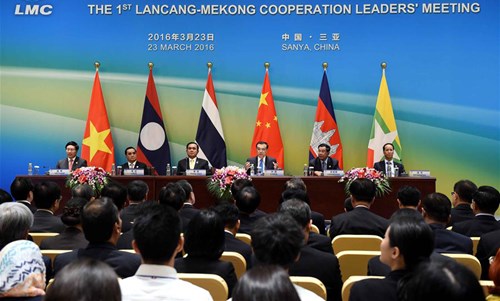The MLC is a sub-regional cooperation mechanism that was jointly
established in 2016 by six countries along the Mekong River, namely
Cambodia, China, Laos, Myanmar, Thailand, and Vietnam.
    |
 |
At the first Mekong-Lancang. Photo: xinhuanet.com
|
The biennial event is organized in rotation among member countries.
The first summit was convened on March 23, 2016, mapping out
orientations for the cooperation mechanism, which is promoting
comprehensive connection to build a responsible community and common
benefit in the Mekong sub-region.
It also aims to improve mutual trust and understanding for
maintaining peace and stability; foster sustainable development, poverty
reduction; narrow the development gap and boost comprehensive
integration into regional and global economies; strengthen the
friendship among the countries.
The member countries will work together to enhance cooperation in
three pillars of politics-security; economy and sustainable development;
culture-society and people-to-people exchange in the principles of
equality, coordination, mutual consultation, voluntariness,
contribution, benefit sharing, and respect for the United Nations
Charter and international law.
Cooperation within the summit will focus on priority fields of
water resources management; connectivity; production capacity
collaboration; cross-border economic cooperation; agriculture and
poverty reduction.
So far, a number of working groups related to water resources,
poverty reduction, connectivity, and production capacity collaboration.
Projects approved at the first Summit have been implemented, while
the Mekong-Lancang Special Cooperation Fund was put into operation.
At the first event of this kind, Vietnamese Deputy Prime Minister
and Foreign Minister Pham Binh Minh said the cooperation mechanism could
pay an important role in promoting sustainable development in the
Mekong-sub region, strengthening relations among six countries,
supporting the countries in implementing the UN Agenda 2030 and
deepening the ASEAN-China Strategic Partnership.
To fully tap potential and new cooperation mechanisms, it is
necessary to sustainably use the Mekong River’s water resources in the
context of serious droughts and salt intrusion in the lower course of
the Mekong River.
Vietnam has actively joined and made crucial contributions to
Ministerial-level meetings and Senior Officials' Meetings, including
proposing cooperation related to water resources, economic connection;
as well as projects on flood and drought management in the Mekong River
basin, and those on harmonization of standards and procedures among the
countries.
Vietnam was willing to coordinate with China and other Sub-Mekong
countries to develop a joint project to establish a center for
Mekong-Lancang water resource cooperation.
At the second Summit, the member countries are expected to approve
the Phnom Penh Declaration and the five-year Action Plan for
Mekong-Lancang cooperation in 2018-2022.
With the theme “Peaceful river and our sustainable development”,
the summit will review cooperation among the countries over the last two
years, discuss future cooperation orientations, and hear reports from
working groups.
Source: VNA